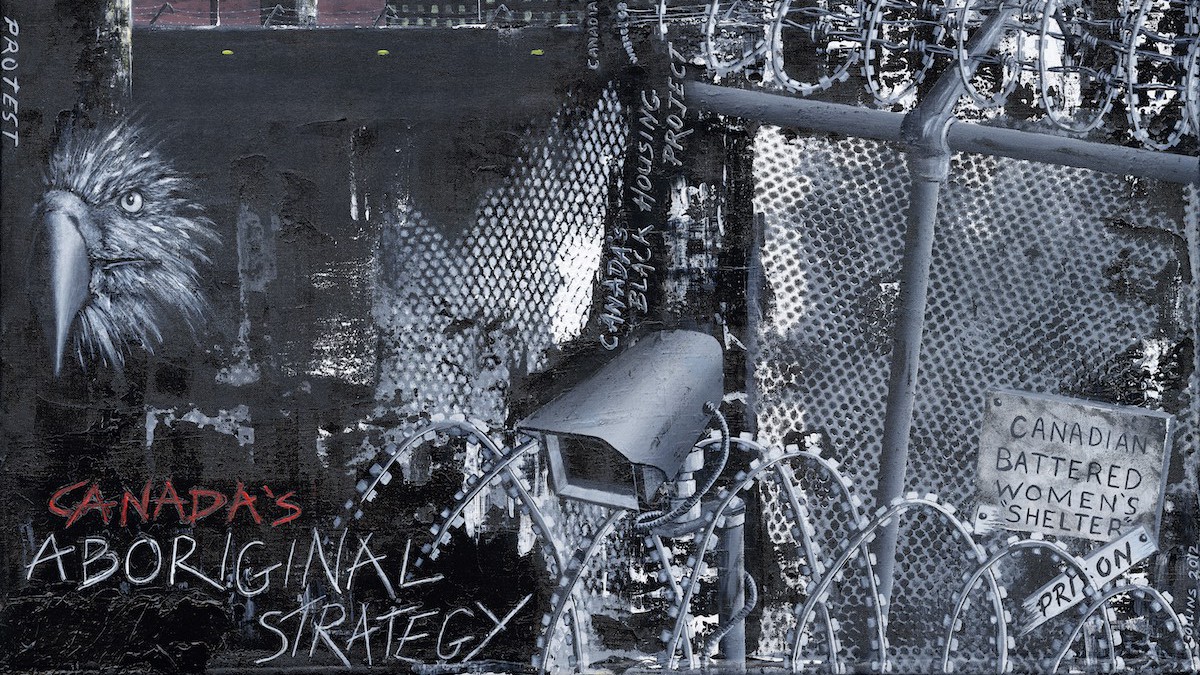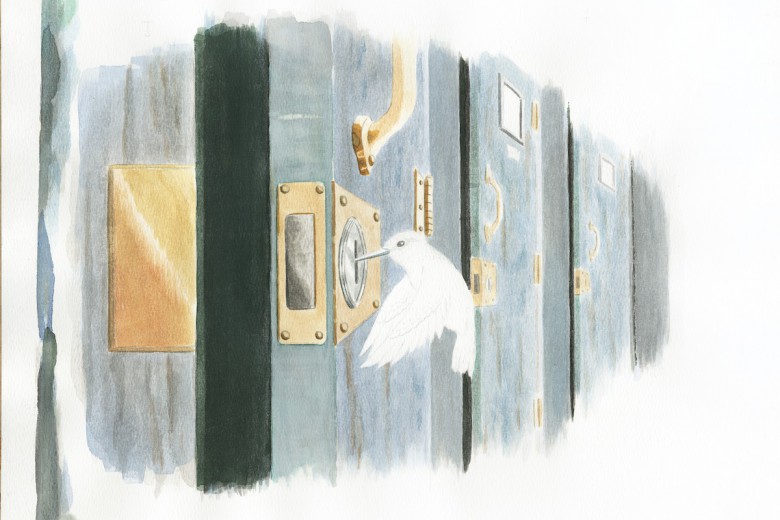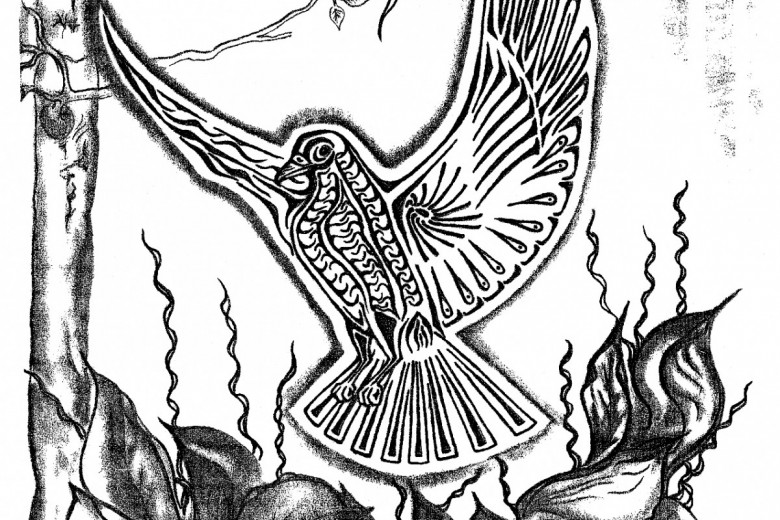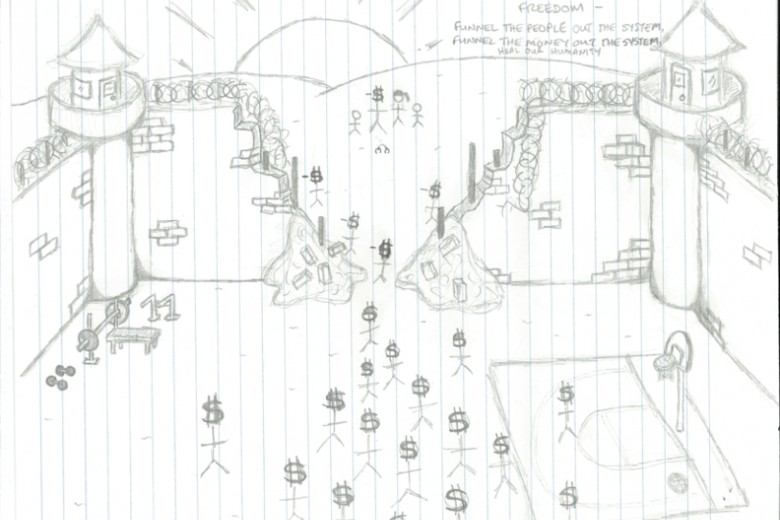Question: would you know true rehabilitation?
I’m going on two decades in prison for a crime for which I was originally offered a four-month sentence in a provincial jail.
In the times of Crazy Horse, Sitting Bull, Red Cloud, Geronimo, and the many braves who proudly gave their lives fighting for the future of our people. They’d been placed in a town structure during the negotiation phase of the forced peace that they were under. When the submitted needed food, they were put in the town corral to kill a cow to divide among the people. It was supposed to give the braves some semblance of normalcy. Brave actions, sacrificing oneself to provide, facing fear, and exhibiting skill on horseback to provide… normalcy…
I was a child when my father took my sister from the bed that she, my older brother who had just died a week ago, and I had shared. I was asleep when it happened. But I awoke to a sound that changed me. I didn’t help her because of the things I told myself: you’re too small, he’ll hurt you. With what needs to be done to stop him, you won’t go to heaven. Please God help us. Run. Please Grandma, come home.
Our forefathers were forced to endure a ridiculous situation or more would die. Intergenerational trauma is the transference of genetics that carry the screams of Christopher Columbus’ invited guests. My dreams consist of the current me sharing a lodge with the departed we’ll once walk with again. In them, my needle-using scars are gone, my tattoos, my stab wounds. I see a white horse, I see a devil dancing, whispering in people’s ears. I shape-shift into a wolf. I fly.
When the submitted needed food, they were put in the town corral to kill a cow to divide among the people. It was supposed to give the braves some semblance of normalcy.
As my face made contact with the floor, I realized I was only inches from the ceiling. For a five-year-old, there’s something fascinating about height and blood. My eyes stung from a pool of my own that I lay in. I wondered what other kids were doing at 3 a.m. with their fathers. With their fathers. As I watched my grandma walk by with my siblings, minutes later abandoning me, I knew what I would be doing at 3:30, 4:00, 5:00.
My fifth lawyer in as many months tells me a reverse onus means that I have to personally convince the courts that I’m not a danger to society. “Our greatest fear is not knowing how weak we are, but how powerful.” For those who know me, reading this quote will bring a knowing smile to their faces. And come to think of it, it’s probably something that our illustrious leaders Shawn Atleo and Phil Fontaine know now. At the outset of my 10-month and three-year remand stint, they spoke to each other about me.
Christopher Columbus’ name translates to the dove, the symbol of peace – the same description he recorded in relation to the beautiful people welcoming him from the shoreline. Then, when his Irish wolfhounds – dogs that stand tall enough to look a grown man in the eyes – got hungry, to this bird of peace, our ancestral Elders became food for his pets. When his shipmates disapproved of his inhumane acts, he claimed that he was having fist-fights with God in his ship cabin. He would come out and say, “It’s all good, mate. We’re on international waters.” Believe it or not, the only part of this I’m joking about is the international waters shit. The rest is 100 per cent true.
The reverse onus was my sustenance, put in the corral to make me feel normal: the fight for my life. My pen and paper is my bow and arrow. My horse is the pride in my heart, and coup counted is the materialization of my sacred dreams.
My fifth lawyer in as many months tells me a reverse onus means that I have to personally convince the courts that I’m not a danger to society.
The unwritten rule with a reverse onus is that the accused must be allowed the same resources as a professional representative (i.e., handwriting analysis, a private investigator, a forensic specialist, video evidence, etc.). What they didn’t realize is that when you kick a person who’s on the ground long enough, they fucking learn to fight back. With my life on the line, please. When I became a glimmer of energy in the cosmos in time and space, my fight for life began.
So because I’d never put pen to paper, ever, I requested a handwriting analyst to inspect the psych assessment done by the prosecutor’s reputed hired gun, Dr. Roger Holden. He’d submitted a battery of completed psychiatric tests that he said I’d done, but I hadn’t. I’d flat-out refused any interaction with him without the audio-visual present, which I’d legally requested from the judge in court and was approved for. This is routinely done to ensure procedural integrity remains intact. I was remanded in police custody to retain counsel and present the handwriting analyst’s findings. Judge Lloyd Deshaye violated procedural due diligence of the defence council argument and, solely on the prosecution’s evidence, he sentenced me to the equivalent of the Canadian death penalty as a dangerous offender.
The Hare Psychopathy Checklist Revised 2nd Edition (PCL-R) is the test in question. Recently, the Supreme Court of Canada ruled it culturally biased, and Correctional Service Canada and the courts are not supposed to use it anymore for Indigenous offenders. Oh yeah, Canada can no longer call any First Nations person a psychopath. Thanks Ewert.
Come to think of it, the reverse onus amendment was also legally discontinued due to it being unconstitutional. Funny how these laws were overturned because they were unfair, and yet their victims still suffer the consequences. Funny how all these devastating things are considered unconstitutional after they were used to render me a statistic. Makes you wonder if they were put in place specifically for little old me. At least someone thinks I’m special.
My pen and paper is my bow and arrow. My horse is the pride in my heart, and coup counted is the materialization of my sacred dreams.
I was 26, one of the youngest people to be tried as a dangerous offender. If a prosecutor red-flags someone as a candidate for a dangerous offender designation, they have usually committed a violent sexual offence, shown a pattern of brutal violence, served multiple federal sentences, and are, on average, 40 years of age. In my knowledge, the dangerous offender was meant more for men who had repeated charges for violence against women, indecent acts against children, or victimizing the elderly and innocent. I had absolutely none of this. All I had to be was of the wrong skin tone, in poverty, from Saskatchewan (a.k.a. Alabama of the North ) and tried in courtrooms that were not easily accessible to friends, family, and advocates. Judge Deshaye, with a smile, told me to put an X on the signature line of the documents that would waive my right to court-appointed counsel. He tried to dupe me into representing myself in a life sentence trial for which a private lawyer would be paid somewhere in the area of $80,000.
No one batted an eye, not even when I faced the entire nation from a jail cell to proclaim my innocence on APTN and condemn the state of punishment and politics in Saskatchewan. I had the help of a treasure of our country, humble and fierce, a brother on the battlefield and a commander above all importance, Mr. Bob Hughes, spokesperson for SCAR, the Saskatchewan Coalition Against Racism, whom I am proud to call friend. He not only heard me, but listened.
With his help, I learned the essence of action emerged from the same dream our Black brothers held when the system whip-strengthened their stride toward change. Lawyers across Canada referred their clients who were also flagged for the D.O. (dangerous offender) tag to me. My efforts were heard, felt, and prayed for across Canada. My efforts consisted of successfully garnering the help of Amnesty International, the Federation of Saskatchewan Indian Nations, the Assembly of First Nations, the Saskatchewan Coalition Against Racism, and the Public Legal Education Association of Saskatchewan. All who knew about my case and were following it thought that I would not only be successful in gaining my freedom, but that my case would also have a positive effect on all future dangerous offender court proceedings. Unfortunately, my brothers’ and sisters’ authorities also heard and felt my efforts. And this was exactly the thought that I’d had at the onset of my case: I would change the system for the better. Not only did I know how to, but I knew who to do it with. The mantra of qualified lawyers and politicians in regard to my case when I asked for help was: “occupational suicide.” They didn’t want anything to do with me, especially because the judge had placed a 50-hour salary cap on any lawyer willing to take my case. So if the reverse onus is rendered unconstitutional, whose responsibility is it now to make sure that justice has been delivered constitutionally? Where are our national leaders? Do you know that if the courts can designate me a dangerous offender, they can designate literally anyone?
What they fail to remember is that precedents are made on a single case, and that precedent can be used to imprison practically anyone, even you.
I have a record that didn’t even result in a federal term – ever. If our national Aboriginal leaders cannot intervene in my case, and they don’t see it as of national importance, what they fail to remember is that precedents are made on a single case, and that precedent can be used to imprison practically anyone, even you. Given where we’re at in this day and age, anything is possible.
Idle No More? “Tough on crime” Harper altered the judicial system in a way that would directly affect Aboriginal people and the underprivileged and impoverished in general, when he was obligated to issue the historic apology for the perversion of the residential schools. Rest in Peace. I’ve shed my tears and burnt medicines in the four directions, praying that the 215 – now 5,296 and counting – have found their way home. To us, paperwork is burial dirt to the people above ground. No other race in our country but Natives are the target of the apology retaliation.
Would you know what true rehabilitation looks like if you saw it? Could you accept the truth of it?
Sincerely,
Andy Peekeekoot (Kutawusin Mahikan)






